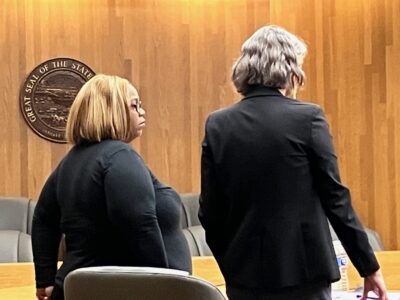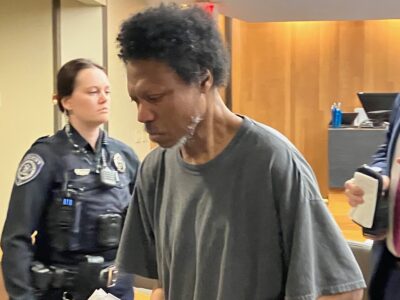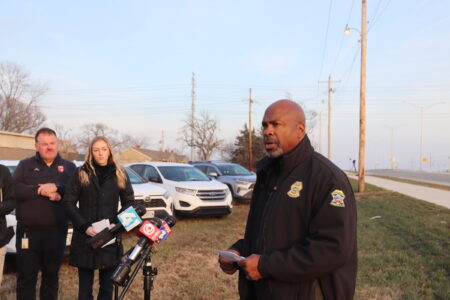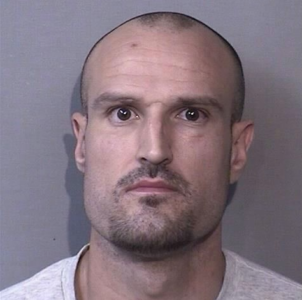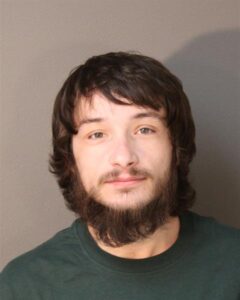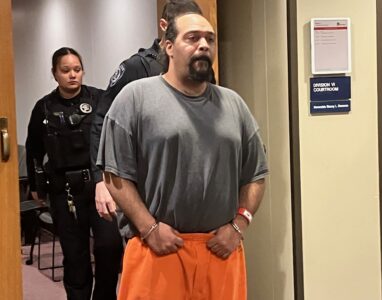Attorneys for woman’s family, towing company tell their versions of who was to blame for fatal accident; jury deliberations begin Friday
Plaintiffs asking for $16M in damages

photo by: Chris Conde/Journal-World
The Douglas County Judicial and Law Enforcement Center is pictured on Nov. 27, 2023.
For the family of a Lawrence woman who was fatally crushed by her car while preparing to have it towed, and for the tow company they’re suing, what happened that day in November 2020 boils down to risky behavior.
What they differ on — and what a jury will have to ponder starting Friday — is who was taking the risks.
The attorneys for the tow company and the driver, Erin VanNatta, say it was the woman herself, 29-year-old Lindsay Raine, who was doing something risky. They argue that, while possibly high on marijuana, she started rocking her disabled Chrysler off of the wooden blocks that it had been sitting on — stable — at the top of her steep driveway. The car came loose, rolled over her and crushed her to death, because of her own decisions that day, they say.
The attorneys for the family, however, say it’s the company that took a risk by not properly training its employee.
Over the weeklong trial, they’ve asserted that VanNatta had an obligation to warn Raine of the dangerous situation that she was in, but didn’t do it, and that this wouldn’t have happened if VanNatta were better trained or more qualified. And, on Thursday, they even seemed to suggest that VanNatta, who was not charged with any crime, may have played a more direct role in Raine’s death.
Both sides got their final chance to tell their version of events to the jury on Thursday in Douglas County District Court, and plaintiffs’ attorney Nick Hinrichs said the “vast majority” of the fault should be placed on Hillcrest for how it trained VanNatta.
“The vast majority goes on this company. They were not operating as they should be,” Hinrichs said.
He argued that VanNatta was hired by Hillcrest because she was owner Jason Kent’s “buddy’s girlfriend” and that she had no experience or qualifications as a tow driver. Furthermore, he said, the training program at Hillcrest was supposed to last two weeks, but VanNatta’s records only documented five days of training.
In addition, he said Hillcrest did not require its drivers to have any safety certifications, read any safety manuals or complete continuing education requirements.
Another attorney for the plaintiffs, Heather Hatley, said that if Hillcrest had trained VanNatta properly, VanNatta would have known better about how to get customers clear from the area during a towing job.
But what Hatley claimed Hillcrest was training its drivers to do was the exact opposite.
Hatley pointed to a police interview with Kent and VanNatta to back that up. She said Kent told police that the company actually frequently had customers help with their own towing jobs.
VanNatta had said that she knew Raine wanted to help with the job, Hatley said, and when Raine asked VanNatta just before the accident if she could help roll the car down the driveway, VanNatta, walking back to get her truck into position, replied, “Probably not.”
If VanNatta were following safety rules, the plaintiffs’ attorneys argued, she would have immediately taken the car keys from Raine and secured the car upon arriving at Raine’s home.
“Untrained drivers in, untrained drivers out. It was only a matter of time before something happened,” Hinrichs said.
At one point, Hinrichs even seemed to allege that VanNatta herself played a more direct role in the accident.
He said VanNatta had initially told police that when the Chrysler started rolling, she tried to move her tow truck behind the car to stop it, but had lost sight of Raine. VanNatta originally told police she felt two impacts against her truck; the first, she couldn’t say what it was, and and the second was Raine’s car. Hinrichs claimed that it was possible that the truck had hit Raine first, knocking her to the ground where the car would have rolled over her.
Ultimately, Hinrichs asked the jury for a specific award amount for Raine’s 15-year-old daughter and 11-year-old son: $16 million in damages. He and Hatley said it was about sending a message to the community and Raine’s family.
“You gotta show these kids that we do the right thing in this community,” Hatley said. “Safety rules matter.”
James Godfrey, an attorney for Hillcrest, however, said that the award being proposed was “an exorbitant amount of money,” and that the plaintiffs’ attorneys were taking a page from a “magician’s” playbook, trying to distract the jury from what was right in front of them.
Whatever VanNatta’s training, Godfrey said her ability to work as a tow driver shouldn’t be in question, because she had completed 1,539 towing jobs in the 18 months before the incident that she had worked for Hillcrest. He said VanNatta even towed Raine’s car just a few weeks earlier with no issues.
The only difference between the two jobs, he said, was what Raine was doing during the second one.
“The risk at that point was Lindsay,” Godfrey said.
When the car was on blocks on the driveway, Godfrey said, it was a danger to no one, and just because VanNatta didn’t immediately take the keys away from Raine upon arriving at the scene, it didn’t mean VanNatta was at fault.
Godfrey pointed out that Raine may have been high at the time of the accident. On Wednesday, Raine’s boyfriend, who was with her just before her death, testified that he and Raine smoked a joint about half an hour before the tow driver arrived. A toxicologist also testified on Thursday that Raine’s autopsy results confirmed she was likely high at the time of her death.
Godfrey argued that, contrary to what the plaintiffs had claimed, VanNatta would never have agreed to allow Raine — who was not even wearing outdoor footwear when she came out to meet VanNatta — to help move the car.
“(VanNatta) had to protect Lindsay from Lindsay? An impossible burden,” Godfrey said.
Twelve people are on the jury in the case, but in this trial, which is a civil and not a criminal matter, only 10 of them have to agree, said Judge Mark Simpson, who is presiding over the trial. If Hillcrest or VanNatta is found to be at fault, the jury would also determine damages.
The plaintiff’s burden of proof in a civil case is the preponderance of the evidence, which means more likely than not that the defendant is responsible for the harm alleged.
The jury is scheduled to start deliberations at 9 a.m. on Friday.


